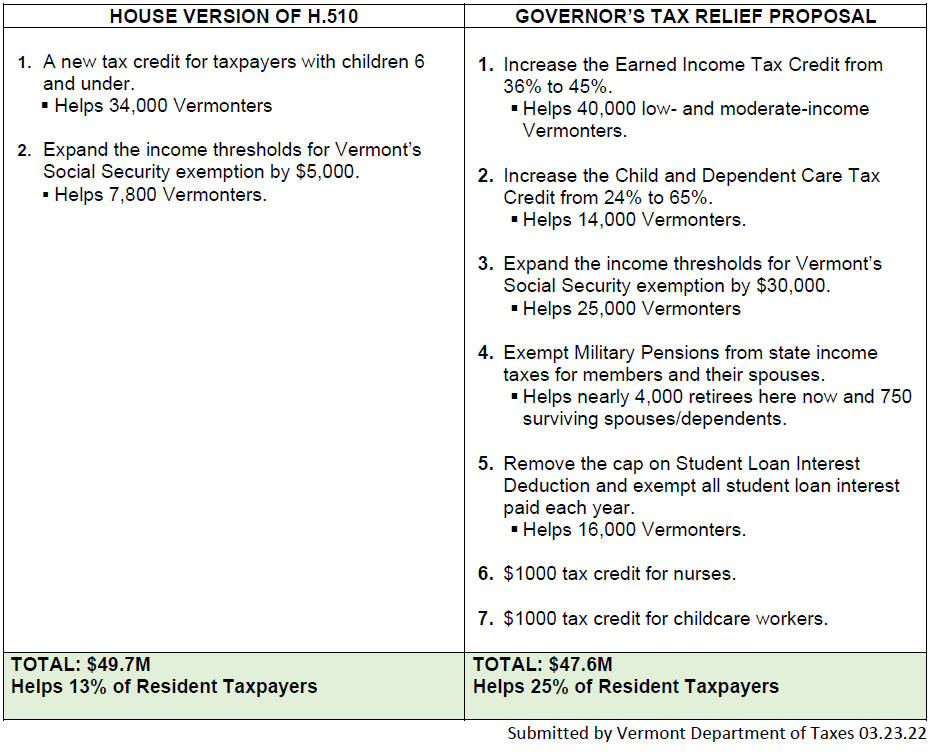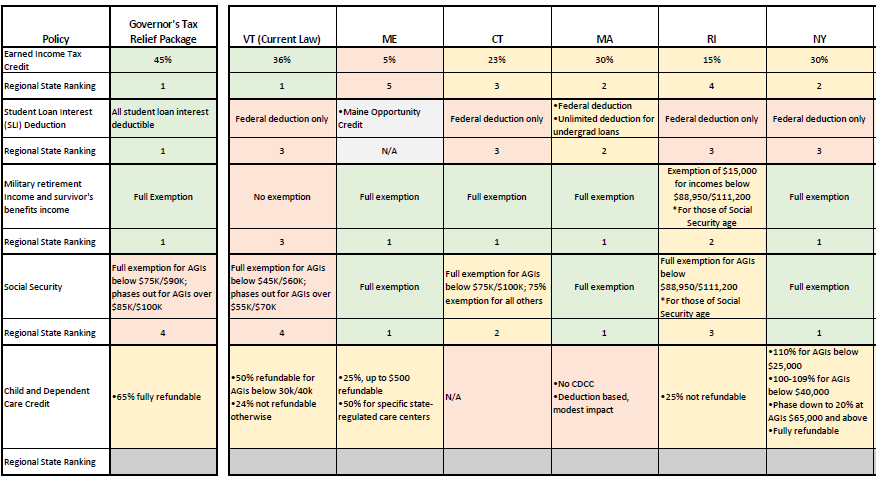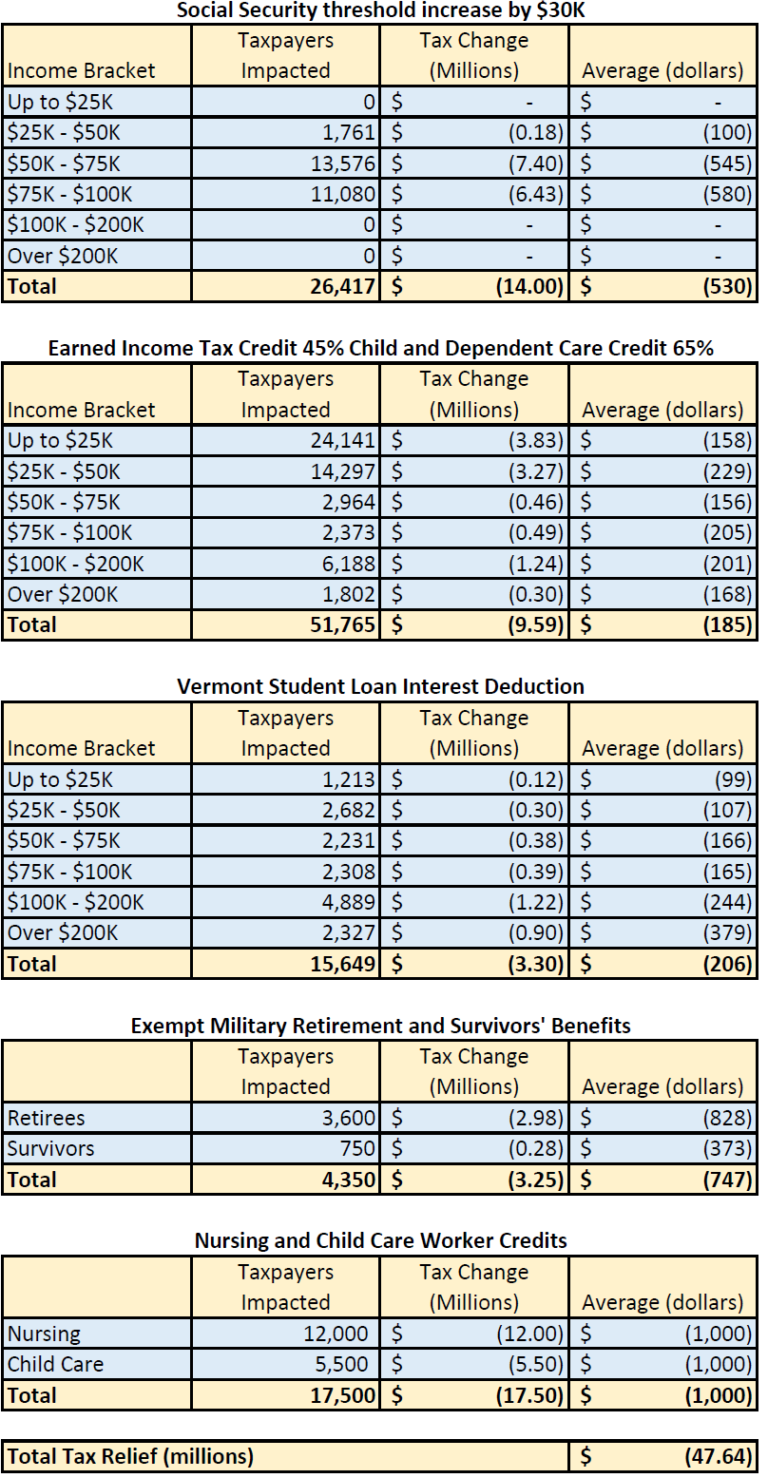Thank you to this week’s sponsor of our Advocacy Update:
March 25, 2022
It was a big week in both the House and Senate as they advanced massive pieces of legislation. The significance is that up until now the members of the House and the Senate have, mostly, been working on their own proposals. After this week their proposals will be reviewed and amended by members of the other chamber as they review and amend what was sent to them.
In this week’s update;
Omnibus Economic Development Bill Passes Committee
The Senate Economic Committee passed the Omnibus Economic Bill after it was delayed last week. H.159 looks much as we previously reported, however, changes have been made to the VEDA loans which had held the bill up.
The Committee worked up to the last minute to finalize the forgivable loan program that will be administered by the Vermont Economic Development Authority. To be eligible for a loan, VEDA shall determine that a business has experienced at least a 25% reduction in its adjusted net operating income in calendar years 2020 and 2021 combined as compared to 2019, or other appropriate bases of comparison where necessary and that 50 percent or more of the reduction occurred in 2021. The maximum loan shall not exceed:
- the lesser of $200,000 or six months of eligible fixed costs;
- or if, due to the nature of the business and its historical experience fixed costs are not an accurate measure of ongoing operational need, another amount based on a comparable measure of cost;
- or the amount of the cumulative decline in adjusted net operating income during the COVID-19 public health emergency in 2020 and 2021.
As the bill moves, there are a couple of concerns. First, the budget passed by the House doesn’t consider the full $100 million in appropriations this bill envisions. Second, the capital investment grants are increasingly becoming an item of contention.
House Passes the Budget and Yield Bill
The House passed H.740, an act related to making appropriations in support of government (the state’s budget bill). The 188-page bill appropriates a total of over $8.12 billion in funding, much more than a typical budget, by utilizing the remaining federal recovery funds and one-time surpluses. This total includes $120M of one-time General Fund appropriations, and $428M of ARPA appropriations in FY23, but excludes $200M of FY 2022 one-time transfers related to pensions. You can see more detail here.
The House also passed the yield bill, H.737, which we covered last week . It deals with most of the ~$95 million surpluses that has been widely discussed this session. H.716 (miscellaneous education law changes), H.703 (omnibus workforce bill with $15 million for CTE), and S.286 (pensions) are also considered being funded by the $95.7 surplus in the yield bill.
This is always a momentous turning point in the legislative session, as once the budget is passed the rules of the road are set and the final countdown to adjournment starts.
House and Senate Both Pass Act 250 Bills
This week, both legislative chambers passed Act 250 legislation. While over the past two biennia there has been plenty of work on Act 250, most of that work has been in the House and the Senate has been responding to what has been sent to them. This is a marked difference, with the Senate sending a hefty bill with issues the Legislature has been grappling with for years and the House sending a bill that mainly focuses on governance of the appeals process. The prevailing opinion among many observers is that both these bills are doomed due to disagreements the House, Senate, and Scott Administration have with each proposal.
In the House:
The House voted 92 to 49 to send H.492 to the Senate. The bill, as we’ve covered the past ten weeks, looks to bring the state back to the early 2000s. It restructures the Natural Resource Board into the Environmental Review Board (ERB) that will hear appeals instead of the Environmental Court. The ERB will have a full-time chair and have five members nominated by an Environmental Review Board Nominating Committee which will have seven members; three from the Governor, two from the House, and two from the Senate. The bill also creates a new pre-hearing discovery period with non-expert witnesses which will be non-admissible later in the process. Finally, it makes the decision of the District Coordinator the final decision if there is failure to appeal a District Commission jurisdictional opinion within 30 days following the issuance of the opinion.
It’s assumed the bill won’t have the strongest reception in the Senate as the Senate Committee on Natural Resources already passed a bill looking to study this issue rather than take action on it. The Administration has indicated in previous legislative proceedings that they are not in favor of this direction.
In the Senate:
The Senate passed S.234 which aims to take a balanced approach to changes to Act 250. What’s in the bill:
- Forest fragmentation: new language creates a new jurisdictional trigger for natural areas in which the state feels development would lead to forest fragmentation. The bill also requires resource mapping for these areas.
- Road rule: language also creates a new jurisdictional trigger in instances when a new road for a driveway or entrance to development exceeds 800 feet or 2,000 feet of multiple roads or driveways.
- Timeliness: If a municipality doesn’t respond with the impact of a project within 90 days, “the application will be presumed not to have an unreasonable burden on educational, municipal, or governmental services.”
- One-acre towns: the bill looks to clarify the Act 250 jurisdiction in one-acre towns in the fallout of legal proceedings that previously had substantial changes to the rule and have since been reconsidered.
- Neighborhood development areas: under the bill a town may have a neighborhood development area if they allow four dwellings per acre. It also eliminates the requirement that the development within the NDA is currently served by sewer or wastewater infrastructure.
- Flood zones: in an effort to allow smart growth in neighborhood development areas, flood zones can be part of neighborhood development areas with suitable infrastructure.
- Priority housing projects (this section was eliminated with an amendment on the floor): The Senate Committee on Natural Resources and Energy this week eliminated the language that would have ARPA-funded projects amended criteria around priority housing projects (PHPs). Currently, PHPs are exempt from Act 250 jurisdiction if 20% of the units meet definitions of affordable housing for 15 years which would have been changed to 80% for no less than 30 years, if ARPA money was to be used for the project. This was an unwelcome change by those that work in those projects who already have a great deal to navigate.
- Governance: while the House sought to overhaul governance, the Senate sought to study it.
- Other items: the bill creates a study committee on the program’s jurisdiction over agricultural businesses and makes changes to hours of operations for deliveries and trucking in the wood products industry.
On the whole, the bill does much more to bring more of the state into Act 250 jurisdiction than it does to make the process easier due to the road rule and forest fragmentation language. The changes to the neighborhood development areas are welcome, however, they are disproportionate in size and scope. It is highly unlikely that the Governor would see the good outweighing the bad if this bill were to make it to his desk.
Conflicting Visions of Tax Cuts In Senate Finance
The Senate Committee on Finance took testimony on H.510, a bill creating a Vermont child tax credit of $100 per month for all children under six in households making less than $200,000 a year. The Commissioner of the Department of Taxes conveyed the opinion of the Administration that they are happy to finally debate how to give tax relief to Vermonters, rather than if. He laid out in very clear graphics the differences between H.510 and the Governor’s package. We’ve shared the charts below which outline the comparison of the two plans, a breakdown of where the different relief would fall among income brackets, and how the package would make Vermont competitive in the region.



Laundry List:
- Here are links to our past advocacy updates from this legislative session: Week 1, Week 2, Week 3, Week 4, Week 5, Week 6, Week 7, Week 8, Week 9, and week 10.
- The House Committee on General Housing and Military Affairs continued work on H.329, a bill making discrimination and harassment claims easier to bring which previously missed the crossover deadline. The Committee tentatively, and for some begrudgingly, carved schools out of the bill and therefore would not hold them to the new standard. They intend to add this language to a germane bill soon.
- The Senate Committee on Economic Development, Housing, and General Affairs walked through H.320, an act relating to prohibiting agreements that prevent an employee from working for the employer following the settlement of a discrimination claim, which was sent to them by the House.
- The House passed H.703, the omnibus workforce bill after some major changes to funding. Most of the funding in the bill was cut in half by appropriators and two sections were cut from the bill; recruitment incentives for early childhood educators and a DOL pilot program for a Regional Workforce Expansion System (section 5 of the previous bill). The changes to the bill can be seen in this amendment. A new fiscal note for the bill can be found here.
- The House Ways and Means Committee decided to postpone work on S.53, the corporate tax bill, by one week after an initial walkthrough of the bill.
- The Senate Committee on Natural Resources and Energy began hearing testimony on H.175, the bottle bill, and listened to concerns about the proposal from a colleague in the House who owns a store that performs bottle redemption.
- The House passed H.730, the miscellaneous alcohol bill. Most notably, the bill creates a new category of alcoholic drinks for retail sale called “ready-to-drink spirits beverages,” mostly referred to as “RTDs.” This legislation paves the way to take this growing market segment out of the controlled state distribution. Direct-to-consumer language did not make it into the final version of the bill and the Committee and Department of Liquor Control are struggling with all the implications. They expect to deal with this when the Senate sends the bill back over.
- The House Judiciary Committee heard additional testimony on S.113, a bill creating medical monitoring, from the Department of Financial Regulation which took a neutral stance on the legislation, however, noted that it could potentially have an impact on the likelihood of insurance companies to insure Vermont businesses.
- The Senate passed their per-pupil spending bill.
- The House passed H.624 which creates $17.5 million in additional financial assistance to creative sector businesses. $10 million would be directed to operational assistance and $6 million would go towards public health upgrades. An additional $0.5 million would be directed to marketing the sector. $250,000 would go to a creative network coordinator position and assistance to a creative network. $750,000 would go to grants to provide affordable housing, studio, exhibition, and performance space to Vermont artists.
Concerned or need to learn more about anything in this newsletter? Email our team at [email protected].
We look forward to working with you.
Sincerely,
The Lake Champlain Chamber Advocacy Team
Help us seek economic opportunity for all Vermonters. Support our advocacy work.
Become a member of the Lake Champlain Chamber or connect with our advocacy team to learn more about sponsorship opportunities
